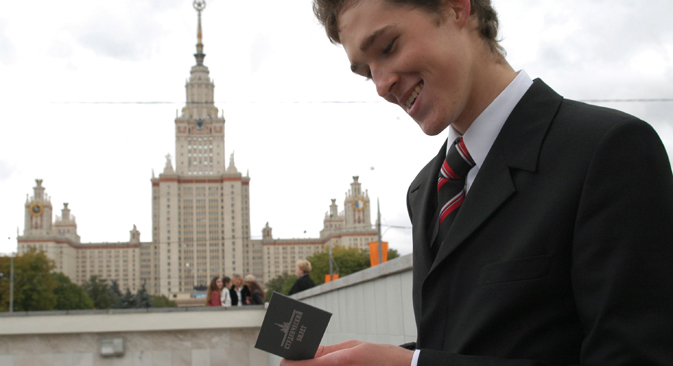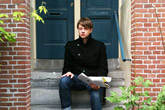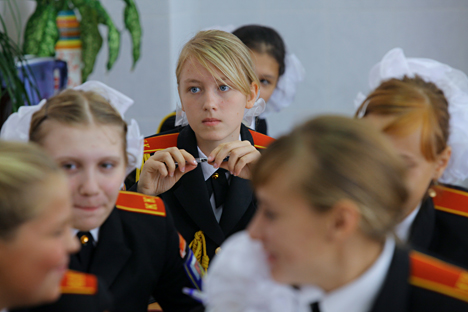Why are Russia’s universities struggling in international ratings?

New state program aims to boost Russian presence in rankings by 2020. Source: RIA Novosti / Tatiana Podoinitsyna
September saw the publication of the international QS World University Rankings for 2014, which this year included 21 Russian universities - six more than in 2013. Three Russian universities made the rating for the first time: the Moscow Engineering Physics Institute (481-490), the Saratov National Research State University (601-650) and the National University of Science and Technology MISIS (701).
For many Russian universities international ratings are still a novelty. Yet in the last ten years the country’s universities and government - after some hesitation and attempts to create their own international ratings - have decided to start playing by international rules.
The new Russian universities on this year’s list made it into the rating thanks to the 5-100 Federal Program of University Support, which includes the participation of 15 Russian universities. Its aim is for five Russian universities to feature in the international rating’s top 100 by 2020.
However, despite the quantitative achievements, none of the Russian universities made it into the prestigious top 100. The best result was obtained by the oldest university in Russia, the Lomonosov Moscow State University (MGU), which was assigned 114th place in the QS Ranking. The question is - what is impeding Russian universities from getting into the top 100?
A question of quality?
The first conclusion that a western reader might draw in the light of Russia’s relatively weak presence in the QS ranking is that Russian education is of significantly lower quality than that available in western nations. The representatives of Russian educational institutions interviewed by RBTH, however, deny this is the case and say the problem essentially concerns what the ratings exactly evaluate and how these criteria correspond to the Russian educational system.
According to Alexei Okunev, rector of the Department of Higher Communications at the State University of Novosibirsk (328th in the QS Ranking), "the criteria of the international ratings reflect the Anglo-Saxon model,” while Director of the Institute of the Development of Education at the Higher School of Economics Irina Abankina says the problem is that “the ratings evaluate only our Bachelor programs and our traditional spetsialitet (Soviet 5-year bachelor program) and aspirantura (Soviet 3-year PhD program) are not counted.”
Most Russian universities (almost 80 percent) switched to the Bachelor-Master system only in 2011. This means that the first wave of Bachelor students who will continue onto the Master and then the PhD programs will appear only in 2015-2016.
A very narrow specialization
The Higher School of Economics (VShE) in Moscow has been rather successful in the sphere of the monetization of educational services. The university, one of the recognized leaders of humanitarian education in Russia today, was founded 25 years ago and operates according to the western educational model, with a large number of full-fee places. Yet the VShE also offers many subsidized places thanks to solid financial support from the state.
Nevertheless, VShE occupies a modest 501-550th place in the QS Ranking. According to the scientific director of the VShE Education Institute Isak Frumin, the low rating is due to the fact that the VShE is a specialized university, while the general QS Ranking targets comprehensive universities, which include medicine, natural sciences and exact sciences faculties.
Frumin accuses the ratings of being “guilty of vague terms and numerous deficiencies,” though deems them necessary “since they provide institutions with a “proven model of the effectiveness of higher education.”
The language barrier
The general lack of proficiency in English is crucial for Russian universities as well. "Our universities are very poorly represented on the internet, especially in the English language, which is why it is very difficult to obtain the information necessary for the rating's evaluation," says Irina Abankina, adding that the language barrier influences the score of academic publications, since in Russia it is customary to publish studies in Russian scientific journals. These publications do not make it to the international scientific databases that are used for the rating's evaluation.
Abankina’s view is shared by Hong Kong professor of communication theory Anthony Fung, who gave a talk to rectors of Russian universities at the Skolkovo Innovation Center this year on how to get into international university rankings. “Language is an important factor,” said Fung, addressing the issue of why Russian universities are underrepresented in international rankings. He pointed out that this meant “no international English publications, no international conferences, no international faculty members, and of course no reaching out…”
Irrelevant criteria
Russian universities have other particularities that impede a swift rise in the international ratings. The traditionally closed nature of technical universities, a legacy of Soviet times, is one such factor. This is especially true of those that prepare personnel for Russia's defense. "The Bauman is a defense-space university, therefore international ratings cannot evaluate us," says Anatoly Alexandrov, Rector of the Bauman Moscow State Technical University (322nd in the QS Ranking).
Another problem, according to Alexandrov, is the difference in interpreting the results of research activity in Russia and the West. "In western culture, being cited is the main criterion for evaluating a university's effectiveness,” he says. “That was never and never will be the case in Russia. For us the result of the research is the idea, the project, the ‘hardware’ that we have made. Or the technology that we have implanted."
“Of course, we recommend [our colleagues] to publish more actively. But there have to be reasonable limits. We publish 3,500 academic articles a year. That’s a lot.”
All rights reserved by Rossiyskaya Gazeta.
Subscribe
to our newsletter!
Get the week's best stories straight to your inbox

